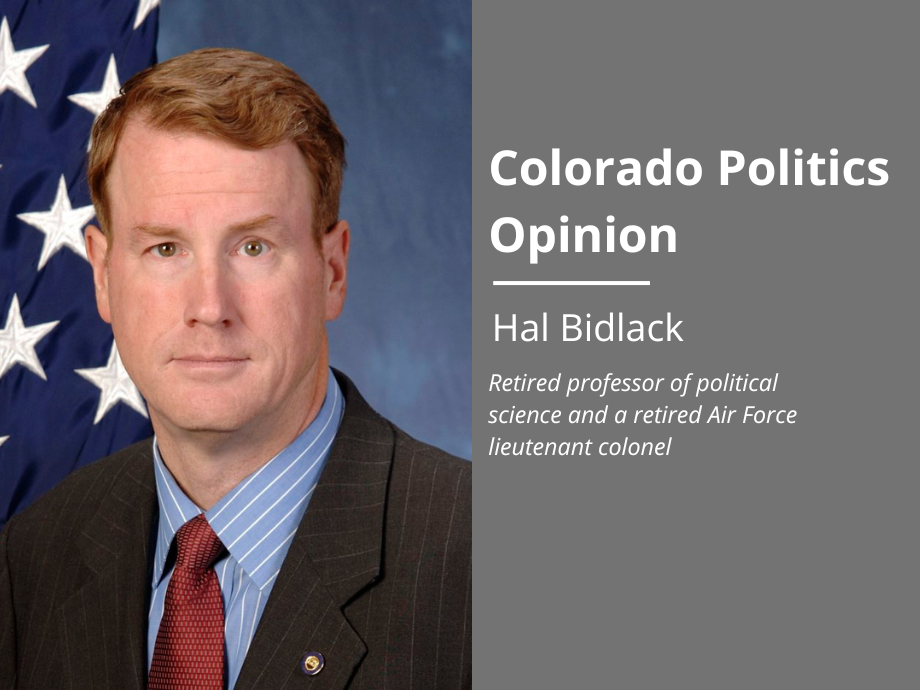Colorado’s cult of Trump forces turbulent times for state GOP | BIDLACK


If you are of a certain age, you may recall the 1968 Democratic National Convention was held in Chicago, and it didn’t go well. Our nation was mired in the Vietnam War, and thousands of protestors arrived in the Windy City to protest the war and how the country was being run. President Lyndon Johnson announced the previous March he would not seek a second term in office, and Vice President Hubert Humphrey was the leading candidate for the Democratic nomination. Humphrey represented the centrist part of the Democrats, and he was challenged from the left by Eugene McCarthy a senator from Minnesota, and, well, the convention was a mess.
There were also considerable riots in the streets, with the firmly “law and order” Democratic Mayor of Chicago, Richard Daily, ordering his police to be, well, aggressive. So aggressive in fact some called it a police riot while others noted it seemed a paramilitary force that was out of control. Humphrey was ultimately nominated and went on to lose a very tight race to Republican presidential candidate Richard Nixon, and you likely know how history rolled on from there.
But what I’m betting you don’t know about Humphrey and the 1968 nomination was his selection as the Democratic candidate marked the end of a long era of “backdoor” politics. Humphrey was the very last nominee to have not won a majority of the delegates selected in state primaries around the country.
Stay up to speed: Sign-up for daily opinion in your inbox Monday-Friday
As it turned out, 1968 was the last year where a relatively few party bosses, through various processes like caucuses and other internal processes, picked the nominee. From 1972 and onward to today, the nominees of both major parties have been those who won the most delegates through a (mostly) primary process. Only Iowa, Nevada, North Dakota and Wyoming, along with a couple of U.S. territories, still select their convention delegates via a caucus system. The trend is clear, and within a decade or two, I predict Iowa will likely be the only remaining caucus state.
Which, of course, brings me to the Colorado Republican Party.
A recent terrific article in Colorado Politics reported on the state’s GOP leaders contemplating abandoning the primary system and returning to some type of “internal” selection process to pick who gets Colorado’s delegates come national convention time. Why? Well, like is so often the case these days, because of a lawsuit. Go ahead and read the article at the link above, it will really be informative. I’ll wait here…
All set? OK…
It seems a lawsuit was filed by four Republicans and two unaffiliated Colorado voters last Wednesday to keep Donald Trump off the state’s primary ballot (oh, and feel free to ignore our continuing state embarrassment U.S. Rep. Lauren Boebert, who didn’t bother to learn the actual facts of the situation – as is her nature), wherein the entire lawsuit was by GOPers and unaffiliated. But Boebert mounted her rickety soapbox to declare: “Democrats in Colorado now want to try and keep Trump off the 2024 ballot. Imagine calling yourselves the party of ‘saving democracy’ while actively seeking to block a candidate from the ballot for no particular reason other than you know he’ll win.”
Sigh…
Again, the Dems had absolutely nothing to do with the lawsuit, but Boebert happily lies, or at best speaks from ignorance, in an attempt to cast the blame on, in this case, the blameless. Log from your own eye, Ms. Boebert?
But I digress…
The argument against Trump being on the ballot is, to an old political science professor like me, quite fascinating. In the unsettled and turbulent years following the Civil War, three Constitutional amendments were passed, in hopes of reducing the chances of future revolutionary zeal and danger to the republic.
The Thirteenth Amendment formally banned slavery, period. It also banned “involuntary servitude” except as punishment for a crime. That just means courts can have prisoners work, if they have been convicted of a crime. I’m going to skip the Fourteenth for a moment.
The Fifteenth Amendment specifically protects the right to vote when it comes to race. It is a shame the drafters were not a bit more expansive, as in a number of formerly Confederate states we soon saw poll taxes and literacy tests, for example, as ways of keeping down Black vote without specifically “denying” that right. It took lots of legislation and Supreme Court rulings to get to where we are, and we still are not truly done in protecting voting rights, but again, I digress…
The Fourteenth Amendment is by far the longest of the three, and the most detailed. The main focus of the amendment was to make it clear everyone born here, to include naturalized citizens, are full citizens of the United States, with all the rights and freedoms that entails. Here’s a link where you can read the whole thing.
But the part of specific interest to the six folks that filed the anti-Trump case comes a bit later, in Section Three, where it says anyone who has previously taken an oath of office in the U.S. and who later engaged in insurrection or rebellion against the U.S., is forever ineligible for any elective office. The six argue Trump’s actions on and before Jan. 6, 2021, were acts of insurrection and/or rebellion. Now, our own personal political views likely shape how we feel about this. I certainly think Trump tried to create a coup, but that’s for another argument and column.
The Colorado GOP appears to be taking an interesting tack, in that rather than publicly defend Trump and claim his 91 felony indictments are all wrong, have simply said they plan to change the rules, should the lawsuit be successful. Put more plainly, the Colorado GOP leaders apparently intend to get their delegates pledged to Trump, regardless of what process it takes. Not since 1968 have we seen a party specifically adopt an internal process to guarantee an outcome that the “regular” Colorado Republicans might not pick in a primary, albeit one presumably without Trump in it.
Now, I do view the various political parties as, essentially, private organizations and they are free to set what rules they wish for their elective processes. I’m actually OK with, for example, closed primaries, wherein you must be a member of the particular party to vote in the primary. But I am not at all sure what the message is that is sent when the party just announces in case they lose in court, they will just change the rules to all but guarantee Trump gets the state’s GOP delegates.
One reason, frankly, I’m kind of OK with this is because under the cult of Trump, the various Republican parties around the nation have become more cults of personality than rational systems to evaluate candidates.
But the big picture, which is so often ignored by these folks, suggests the more insular they become, the more hooting and hollering we see for Trump, at the still-to-be-specified “internal process,” the more distant the GOP grows from the majority of Colorado voters. The more they demand Trump, regardless of the indictments and other hazards, the more certain a Democratic victory in 2024 becomes.
So have at it.
Hal Bidlack is a retired professor of political science and a retired Air Force lieutenant colonel who taught more than 17 years at the U.S. Air Force Academy in Colorado Springs.












